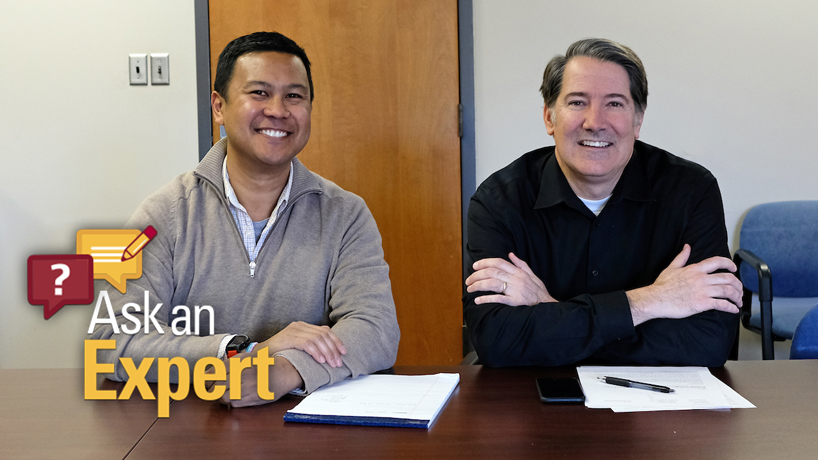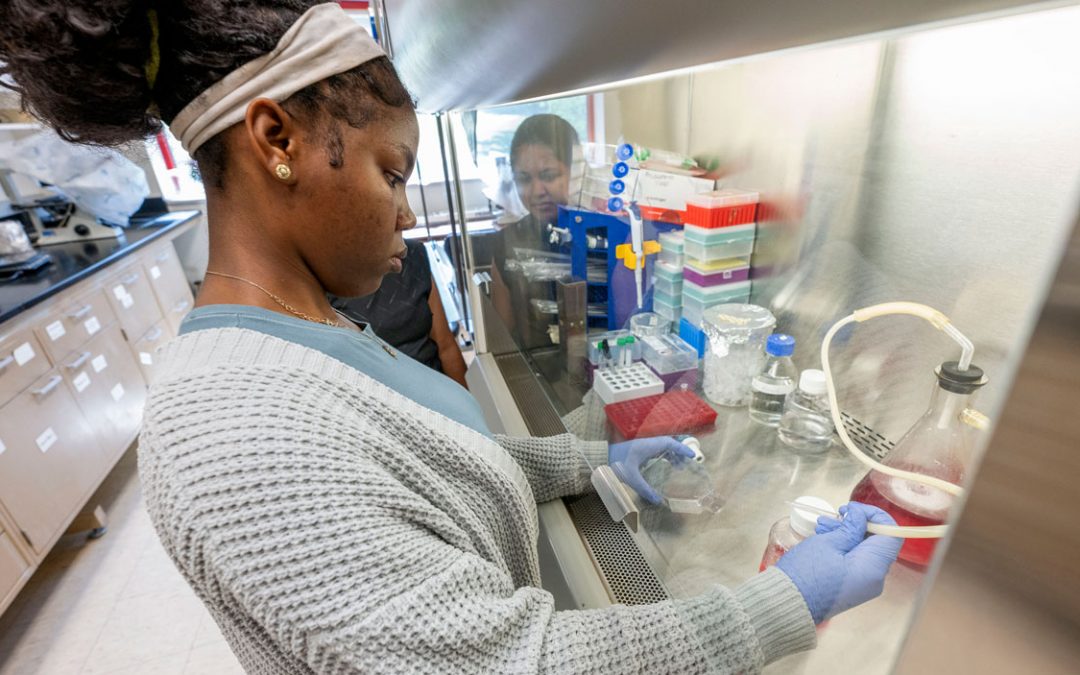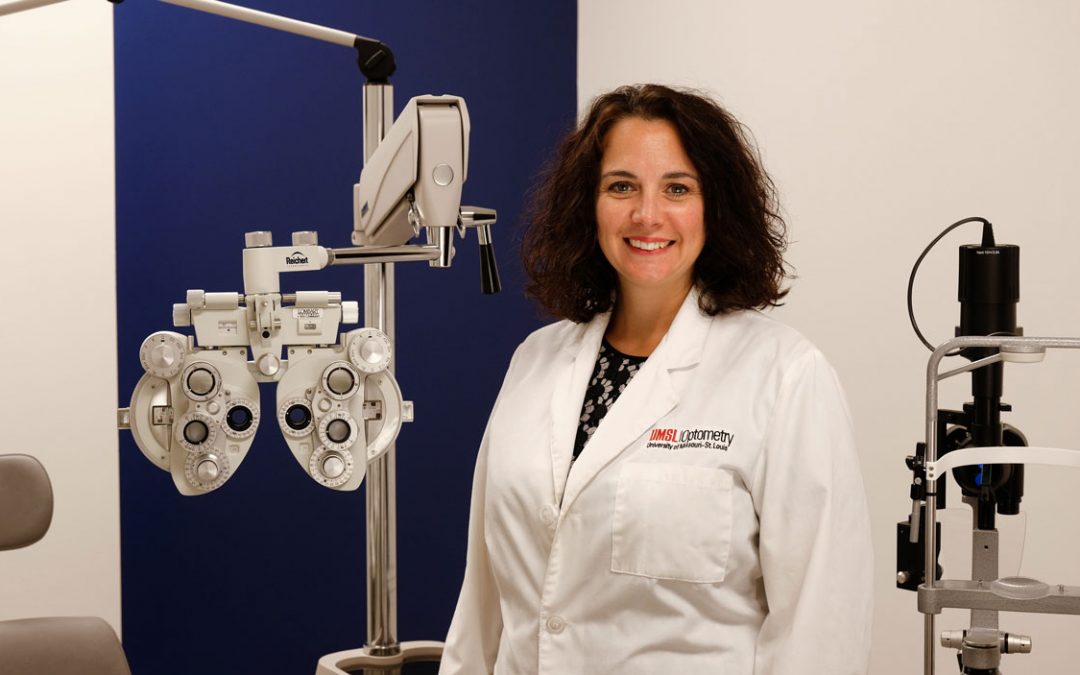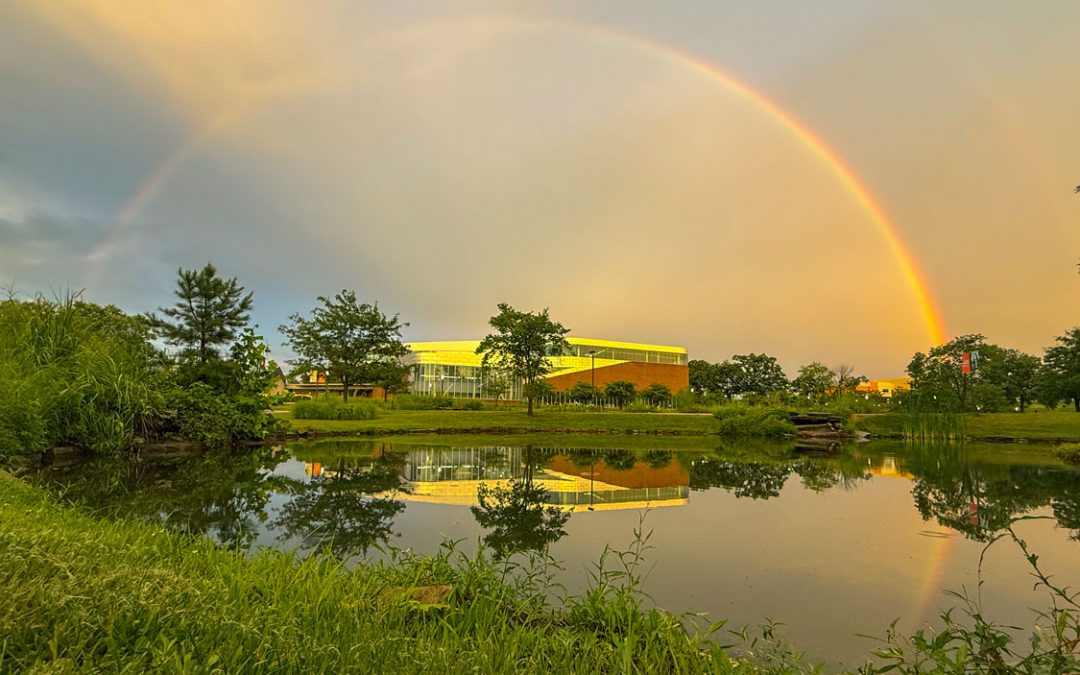
UMSL Political scientists Adriano Udani (left) and David Kimball joined former colleague Brian Fogarty in publishing a paper titled “How Local Media Coverae of Voter Fraud Influences Partisan Perceptions in the United States.” (Photo by August Jennewein)
Voter fraud has increasingly become a topic of debate, particularly in the lead up to national elections.
Last week, ahead of Tuesday’s midterms, President Donald Trump told a group of reporters: “There are … a lot of people that try to get in illegally and actually vote illegally.”
He was not the only politician to raise the specter of voter fraud ahead of the polls opening.
University of Missouri–St. Louis political scientists David Kimball and Adriano Udani and their former colleague Brian Fogarty, now at the University of Glasgow in Scotland, have researched the role that local media play in raising concerns about voter fraud among the public.
Earlier this year, the trio published a paper titled “How Local Media Coverage of Voter Fraud Influences Partisan Perceptions in the United States” in the journal State Politics and Policy Quarterly.
In the latest installment of the “Ask an Expert” series, UMSL Daily spoke to Kimball and Udani about their research.
When did voter fraud become an issue again? How is it that it started to become more talked about and covered in recent years?
DK: I would go back to the 2000 presidential election. That was a knife-edge result that hinged on a few hundred votes in Florida, and that focused a lot of people’s attention on the fact that a really close election could come down to lots of minor, mundane factors like the voting equipment or the way the ballots are designed or the way poll workers enforce the rules and, potentially, fraud. It seems to me that since that election there’s been more emphasis among some to make voter fraud a political issue.
Is it a political issue? Is there any bipartisanship about voter fraud or has it just become an issue for voters on one side of the political spectrum?
AU: I think both sides would care about the integrity of elections. It’s a difficult issue to argue against. Who wouldn’t want their elections to have a lot of integrity? But I think where we see it diverge, in terms of the biases among partisans, is Republicans and conservatives are more likely to view voter fraud as a problem and voter suppression as not a problem. Democrats are the opposite. They think suppression is a really big issue but voter fraud is rare and nonexistent.
How much research has been done into fraud and the existence or nonexistence of it?
DK: There’s been some research on the existence of it, and that research tends to show that voter fraud is a very rare event. By voter fraud, I mean a voter voting illegally – voting twice or pretending to be someone else or somebody who’s not a citizen voting. But it’s difficult to research because gathering data on incidents of fraud or allegations of fraud is kind of sketchy. There’s been a greater effort in the last five or 10 years or so to measure that using a variety of different techniques, and those studies all conclude that voter fraud is very rare in the United States.
How do you go about investigating it or researching it?
DK: Some compile court records, prosecution records of anybody charged or convicted of voter-related offenses. Some have compiled records from news stories – any allegation of fraud whether or not there’s a formal charge. Others have looked at the vote counts and asked voters themselves, trying to study individual voters.
Voter fraud is often used as a justification for passing laws requiring photo ID, requiring people to show proof of citizenship when they register. Those laws have been challenged in court in several states, and then the discovery and testimony phase of those court proceedings provide an opportunity for the state to provide evidence that there’s voting in our state and an opportunity for the challengers to provide their own evidence and impeach the state’s evidence. Those cases, particularly a recent one in Kansas, have gone badly for the state. In the Kansas case, the judge ruled against the state, and the ruling said, in effect, “You guys said there was all this fraud, and you didn’t show me anything.” The court challenges to some election laws have also provided us some information about the extent of voter fraud.
What made you guys decide to look specifically at media coverage of voter fraud?
AU: The origin of the study was to look at whether you think voter fraud is a problem, and the extent to which it occurs in elections is tied to who you think is committing voter fraud. So the people involved. People’s perceptions and racial prejudices, ethnic prejudices color this issue of voter fraud and their beliefs. So we were interested to see that association show up in their views of immigrant groups as well as immigration being controlled in the United States – whether they think their elections are being tainted by those who aren’t eligible to participate.
I think that’s when we started getting into the media coverage. Obviously people don’t think of these things on their own. They have to read them somewhere, so we were interested to see if in some areas voter fraud is covered more than in other parts of the country. If so, we wanted to see if media coverage of voter fraud influenced people’s perceptions of it. It did. I think there’s pretty conclusive evidence that in areas where the media covers voter fraud disproportionately, more people in that particular media market feel that it’s occurring very frequently.
DK: One thing that I would just add is that we’ve now done three national surveys asking people about voter fraud, and we find public beliefs about voter fraud are pretty widespread. A lot of Americans tend to believe voter fraud happens quite frequently, and yet there’s this growing body of evidence that it doesn’t, so where are they getting this idea? It seemed to us they’re getting the idea frequently from messages they hear from politicians and from what they have seen in the news.
AU: This story was even before Donald Trump and his allegation, from 2017, that 3-5 million illegal immigrants participate. The data that we were using came from 2012, and you could arguably say that voter fraud wasn’t as salient an issue in 2012 as it is now.
You used to always hear stories about what used to happen in Chicago with the political machine, so there was always this idea that voter fraud could happen in the United States because it happened before. How much is that baked into people’s minds?
AU: I think the history of questioning people of the opposite party or of new voters is as old as the country. So even with the machine in Chicago, it is sort of part of the history of using it to people’s advantage sometimes – packing the polls. I think that’s part of it. I think what’s different now is that they’re using the issue to impose more restrictive rules for participation.
Specific to the question of media coverage, you were looking at local media coverage, correct?
DK: We just looked at newspapers, but I suspect TV coverage isn’t any better. I’m guessing we would find a similar pattern with TV. One interesting thing that we noticed was that a lot of the newspaper coverage of voter fraud was actually reporting on allegations of fraud taking place in a different state. The allegations and the news coverage of voter fraud tend to be more frequent in battleground states, so one suspicion I guess I have – I don’t want to speak for the others – is that we tend to see allegations of voter fraud when there’s a big election coming up. “A big election’s coming up. There’s some allegation of fraud somewhere in the country. This is interesting. Let’s cover it even though it’s not our state.”
You published a piece in The Washington Post in 2017 about your research on the connection between belief in voter fraud and feelings toward immigrants. Is this a continuation of the research?
DK: Yeah, “Where do these beliefs come from? Why do so many Americans think voter fraud happens frequently?’ Many Americans support policies like photo ID laws designed to combat voter fraud, too.
AU: Our new research, now that we know where it comes from and we know that their beliefs are tied to some of the racial and ethnic dispositions, I think the next phase of it is to look at, “Can we actually correct these misperceptions of voter fraud?” and to work toward understanding, “If we do correct them, can we also reduce the support of voter restrictions?” There’s this very strong correlation between viewing voter fraud as a problem that’s widespread and supporting laws like restrictive photo identification, proving that you’re a citizen before registering. I think the project excitingly is moving into the advocacy realm and looking at if there’s a way to actually talk to voters about that – “This isn’t as widespread as you think” – and to understand the consequences of believing that voter fraud is supporting these restrictive forms of participating in a democracy.
So that’s what you’re doing now?
AU: Yeah, we’re part of a research consortium called the Cooperative Congressional Election Study. It’s a consortium of researchers from 50 or 60 universities. Everyone pools together their modules or their subsamples, and it’s actually a pretty large representative sample of the U.S. electorate. Each team has their specific projects, but there are some common questions across all 60 teams.
When did the two of you first start working together?
DK: It’s been a while – 2013 or 2014?
AU: Yeah, I came here in 2012, and my research is more on people’s perceptions of immigration and immigration enforcement and immigrants, and David’s more of the election administration guy. I always had this sort of feeling that people’s perceptions of immigrants are tied to the performance of elections, and we sat down and chatted one day and dug into some available data. Back then, there were very few measures that we had to put these two things together – people’s attitudes toward immigrants and then their support for voter restrictions and their beliefs about voter fraud. Since 2014, we’ve had four national studies, which is pretty cool to shed light on something that has been overlooked for a while.














